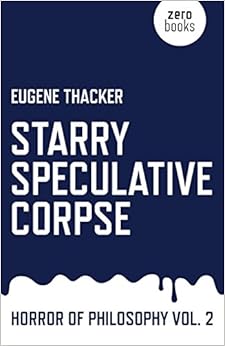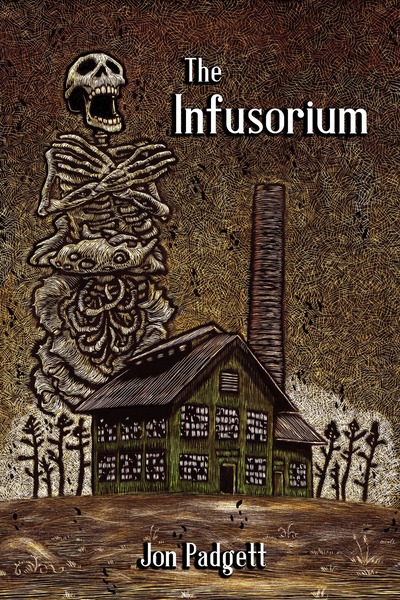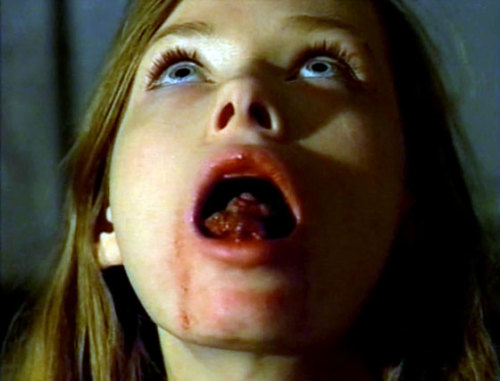I have always been a great lover of books. Crisp white pages. The smell of a new book. Great cover art. Beautiful prose. Luckily this is a great time to be book lover. The small press scene is exploding with all kinds of fantastic limited edition tomes made with great love of the weird horror genre. One of the newest and most promising small presses out there is Dim Shores Press. They make beautiful limited edition but extremely affordable books by some of the best authors in the field, authors like Jeffrey Thomas, Scott Nicolay, and Matt Bartlett. I recently had a chance to chat with Sam Cowan, the founder of Dim Shores Press.
Plutonian: First off thank you for taking the time to answer some questions.
Sam: Happy to do so, thanks for asking them!
Plutonian: As a lover of books and genre fiction it has always been a dream of mine to have my own book press. How did you get into book publishing?
Sam: I had done a couple of nonfiction books in the past through my day jobs; I’m a production artist and technical writer, usually. One was a small book on computer security by Bruce Schneier, and the other was a textbook on doing statistics with Excel. The textbook was not fun at all, and I focused on other stuff for a while. I was unemployed for a good chunk of 2010 and 2011, doing freelance work but no day job. I got involved with a small press that was starting up in Davis and worked with them for a couple of years. I didn’t expect to get rich there, but I never made any money from that – like any, at all – so after seven print books and four e-books I left.
I enjoy doing layout and wanted to keep doing books but was having trouble getting work. I talked with a couple of larger genre presses but that never came to anything. Finally I said screw it, I’ll do it myself.
Plutonian: Can you tell us the origins of Dim Shores press and also how the name for it came about?
Sam: Once I decided to do something, I put together a spreadsheet and looked at a bunch of numbers. When my eyes unglazed I settled on short-run chapbooks as the least financially stressful way to go. I sold some of my books and records to get starting money while trying to come up with a name. I was paging through some of my books looking for inspiration when I came across this passage in Clark Ashton Smith’s “The Coming of the White Worm:” Beyond the verges of the ice he saw a sea that lay remotely and far beneath; and beyond the sea the low looming of a dim shore. I really liked the image that made in my brain, very mysterious and ominous. It also helped that dimshores.com was available.
Plutonian: Dim Shores has some of the most interesting weird horror authors like Nicolay, Bartlett and Thomas in its ranks, can tell us how you first came across these author’s work?
Sam: I met Jeffrey Thomas at NecronomiCon 2013. I spent a very enjoyable evening in a bar with Jeff and Justin Steele and we have stayed friends since. I have to admit I didn't know much about Jeff’s work at the time but he was such a great guy that I sought it out. I’m very glad I did. Scott Nicolay was actually my room mate at that same convention. We knew each other a little bit from message boards but had never met. Again, he was a great guy so I tracked down as much of his work as I could and liked it a lot.
And speaking of Justin Steele, it was his review blog The Arkham Digest that turned me on to Matthew M. Bartlett. He gave Matt’s “Gateways to Abomination” an excellent review and it sounded so intriguing I immediately ordered a copy. It turned out to be one of my favorite things I read in 2014. We struck up an online friendship, and I jumped at the chance to release one of his stories. I finally met Matt at NecronomiCon 2015 and we had a blast.
The weird community is absolutely brimming with friendly and helpful folks, and I probably wouldn’t be doing Dim Shores if I hadn’t gone to NecronomiCon and a couple of H. P. Lovecraft Film Festivals and met the people that I did.
Plutonian: Can you talk about what you feel the importance of weird horror is?
Sam: For me personally, it is a way to shunt the horror and general dread that comes standard with being alive. Weird horror is one of the few things that achieves that level of disassociation for me. I’m not a fan of the more extreme and/or graphic and/or realistic horror. While I was a gorehound as an angry teen-ager, I loathe the so-called torture porn genre and generally avoid splatter stuff. I’m much more interested in threats to the mind than the body.
In general, I think weird horror is most important for sneaking in new ideas and viewpoints to the larger horror and dark fantasy world. Weird fiction by it’s nature often takes an unusual approach, and sometimes that bubbles up in to the more mainstream areas.
Plutonian: What are the “ must read “ weird horror books ( novels and collections ) to you?
Sam: Man, there are a bunch. Like a lot of people, my introduction to weird fiction came via Lovecraft. I still think he is well worth reading, and I am very glad to see the weird community address the more problematic aspects of his work. Some stories are so virulently racist that it’s actually a little startling; that doesn’t mean he shouldn’t be read at all, just that he should be read consciously. Of all his works, my favorites are “The Dream-Quest of Unknown Kadath,” “At The Mountains of Madness,” and “The Case of Charles Dexter Ward.” These are also some of his longest stories, which is funny because I think the weird usually works best in shorter pieces.
I am sorely under-read in the classics of the genre, but I can add Clark Ashton Smith as another essential weird writer. He is at time almost whimsical, and then there are pitch-black stories like “The Isle of the Torturers” that just pile on the doom and despair. For both Lovecraft and Smith, I’d say get the Penguin Classics editions and go on from there.
For more current writers, top of my list is Thomas Ligotti. I stumbled on to a copy of “The Shadow at the Bottom of the World” and it just blew me away. And Penguin Classics just released an edition of his first two collections in one book, an incredible value as previous editions are hard to come by and quite pricey. Unmissable.
“The Sea of Ash” by Scott Thomas is a fantastic story, also one of the best things I read in 2014, along with the previously-mentioned “Gateways to Abomination.” Richard Gavin’s “The Darkly Splendid Realm” made a huge impression on me, as did “Nightingale Songs” by Simon Strantzas and “The Wide Carnivorous Sky” by John Langan.
For another flavor of weird, Cody Goodfellow does things and goes places where few others venture. His collection “All-Monster Action” is by turns enthralling, gross, brilliant, and gross. I could say the same about his latest novel “Repo Shark” but I wouldn’t really classify that one as weird horror, more a bizarre adventure kind of thing. I do recommend it though.
Scott Nicolay’s “Ana Kai Tangata” is a very impressive debut collection that I loved. The stories are longer and Scott has room to stretch out and lay solid foundations for the very un-solid things that happen. The title story is a particular favorite.
Laird Barron has written one of the few weird novels I’ve read, “The Croning.” I loved it, and his short story collections are also excellent. He has a reputation for hard-boiled weird noir, and I really enjoy that, but he also writes from other perspectives and those stories are just as enjoyable for me. I recently read S.P. Miskowski’s “Knock Knock,” another weird novel that I really liked and highly recommend.
And pretty much anything by Jeffrey Thomas could be on this list, seriously. I’m happy that there is still a lot of his work that I haven’t read, because that means I still get to read it for the first time. I recently read his freaky “Subject 11,” maybe start there or with one of the Punktown books.
Joe Pulver’s “Blood Will Have It’s Season” was one of the more difficult books I’ve read. At times it is extremely graphic and those parts were hard for me to get through (I would take breaks and read from “The Hitchhiker’s Guide to the Galaxy” for balance), but it is worth the effort. No one else writes like Joe, and what he is doing is both important and very interesting.
This is a short list made up of what first came to mind. I’ll stop here in interest of time and space, but there are literally dozens of other authors and books I consider essential.
Plutonian: Do you have any favorite horror films?
Sam: I don't watch a lot of horror movies (or movies period) these days but I do have some perennial favorites. The first horror movie I saw on the big screen was “An American Werewolf in London.” I was 12 and it literally scared me out of the movie theater. I did eventually see the whole thing, a number of times. Most everyone I know would probably include “Alien” and John Carpenter’s “The Thing” on this list, and I will too. I love both unconditionally. The “Evil Dead” films and “Dead Alive” are so much fun. Stuart Gordon’s “Dagon” captures a truly weird and Lovecraft-ish vibe, not nearly as campy as the also beloved-by-me “Reanimator” and “From Beyond.”
About the only recent horror movie I’ve seen is “Beyond the Black Rainbow.” That will require another viewing or two to parse, but I was quite taken by the general atmosphere of the movie.
Plutonian: Do you celebrate Halloween? Any Halloween traditions?
Sam: I love Halloween but don’t really make a big thing of it anymore. My wife and I usually go to a party thrown by friends, or stay home and hand out candy to the few kids that actually trick-or-treat around here.
Plutonian: How has social media affected the small press scene?
Sam: It is hard for me to say, as I was not really involved with the scene in the days before social media. MySpace was the first social media thing in which I participated, and it was there and through the Thomas Ligotti forums (ligotti.net) where I first came across, and became friends with, a number of the people I’ve mentioned here.
I have always been a huge music fan, and I do remember what that was like before the rise of social media, or even the internet in general. I found out about new bands and records through zines and college radio, but if Tower Books didn’t carry it or KFJC didn’t play it, I probably wasn’t going to hear about it. These days most of the new stuff I find is through Facebook and Bandcamp.
There wouldn’t be a Dim Shores without message boards and a hub like Facebook. So far my marketing strategy has been fairly non-existent, just “I don’t know, post it on Facebook I guess.” While not the most effective, it is also basically free. And that is where social media really has an impact on all creative scenes: it is worlds easier for creators and people who are into what those creators do to find each other now. Social media and the ability to economically print short run and print-on-demand books revolutionized – are still revolutionizing – all aspects of the publishing process. It is incredibly easy to go to Facebook or Goodreads and find out about new authors and books. Digital printing allows people like me to do print runs of 100 or 150 chapbooks at a reasonable cost, and Facebook, blogs, and even (ugh) Twitter help spread the word and reach readers without costing anything except time.
Plutonian: What is the future of Dim Shores? ( where would you like to see it go? )
Sam: I am sticking to chapbooks for now, but some time next year I would like to expand to anthologies and maybe even single-author collections. I have an anthology idea and a wish list of authors to invite, but financially I’m not quite there yet. We’ll see!
Plutonian: What upcoming works are in the pipeline from Dim Shores?
Sam: I just sent the next chapbook off to the printer: “The Nectar of Nightmares” by Craig Laurance Gidney with art from Orion Zangara should be printed and in my hands before the end of the month. It is more fantastical than horrific, a little different from the first three chapbooks, and that is exactly what I want to do. Dim Shores books will always have a dark edge to them but will not always be horror as such.
After that will be a chapbook from S.P. Miskowski, scheduled to be published in December. Gemma Files is writing a story that should see the light of day in February, and I have a cool story in hand from Cody Goodfellow that I need to schedule.
There are three other projects in the works. One involves Jeffrey Thomas again, and one is with another alumni. The third hasn’t been officially revealed yet. I will be publishing an older piece by a currently active master of the weird who has not been named in this interview. It’s long, about 23k words, and I hope that will be out by Spring. Once I actually get into the layout and we have an artist attached I’ll spill more beans.








.JPG)
